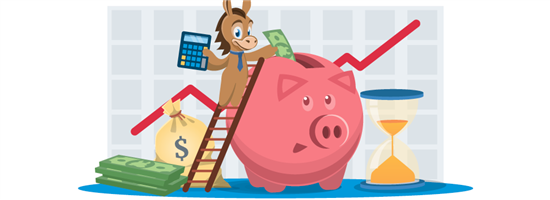Savings Calculator
Ad Disclosure: This article contains references to products from our partners. We may receive compensation if you apply or shop through links in our content. This compensation may impact how and where products appear on this site. You help support CreditDonkey by using our links.
Your money earns interest in your savings account. But how quickly will it grow? Use this free savings calculator to see how much you'll earn over time.
 |
Whether you're saving for retirement or for a down payment on a home, this calculator will tell you how fast you can reach your goals.
Just enter your:
- Initial Balance: Your starting amount, or how much you'll deposit when you open an account
- Monthly Contribution: The amount you plan to deposit every month
- Years to Grow: The number of years you let your money grow
- Interest Rate: The annual percentage you expect to earn from your savings or investments account. You can also choose how interest will be compounded (monthly, annually, etc.)
Saving money can feel like an uphill battle. Keep reading to learn how you can reach your savings goal faster.
What's a Good Interest Rate?
Your interest rate can make a big impact on how quickly you can save. According to the FDIC, the national average interest rate for savings accounts is just 0.40%.[1]
An account that offers more than the national average is a great place to start. Many online savings accounts offer rates up to 10X the national average:
CIT Bank Platinum Savings - 3.75% APY
- Monthly Fee: $0
- APY: 3.75% APY with a balance of $5,000 or more
Learn More: Best High Yield Savings Accounts
How Much Should I Save Each Month?
Try playing around with your monthly contributions in the calculator. You'd be surprised to see how even a small increase can really impact your total savings.
But setting aside extra money every month isn't always easy. You might have to take a look at your budget to see where you can cut down on spending. Check out these tools to take control of your money and boost your savings:
- Free Budget Calculator: Visualize your monthly cashflow and create a budget.
- 50/30/20 Calculator: Divide your paycheck according to the 50/30/20 rule.
- Online Budgeting Tools: Check out the 10 best apps to help you manage your money.
If you put your money in a traditional bank that earns 0.01%, you'd have $20,002.00 by the end of the year. In a high-yield savings account that earns 0.60%, you'd have $20,120.
Where Should I Keep My Money?
You've got a couple options to keep your extra money safe. A high-yield savings account is a great start, but be sure to consider these other options too:
| Account Type | Best For |
|---|---|
| High-Yield savings account | Quick access to cash when needed |
| Money market account | Savings account with check writing |
| Certificate of Deposit (CD) | Locked-in interest rates |
| Checking account | Disposable income and everyday expenses |
| Investment account | Long-term savings for retirement and more |
Bottom Line
Interest-bearing accounts can help you save and earn more money—much better than stuffing cash under your mattress.
Interest rates play a big role in how fast your money will grow. Before you open a savings account, use our calculator to compare rates from different banks. Online banks will usually have the best rates available.
And remember, your savings will grow surprisingly fast even with modest contributions each month. The most important thing is to stay consistent and keep saving. Each step will take you closer to your goals.
References
- ^ FDIC. National Rates and Rate Caps as of February 20, 2024, Retrieved 03/06/2024
Donna Tang is a content associate at CreditDonkey, a bank comparison and reviews website. Write to Donna Tang at donna.tang@creditdonkey.com. Follow us on Twitter and Facebook for our latest posts.
Note: This website is made possible through financial relationships with some of the products and services mentioned on this site. We may receive compensation if you shop through links in our content. You do not have to use our links, but you help support CreditDonkey if you do.
Read Next:



